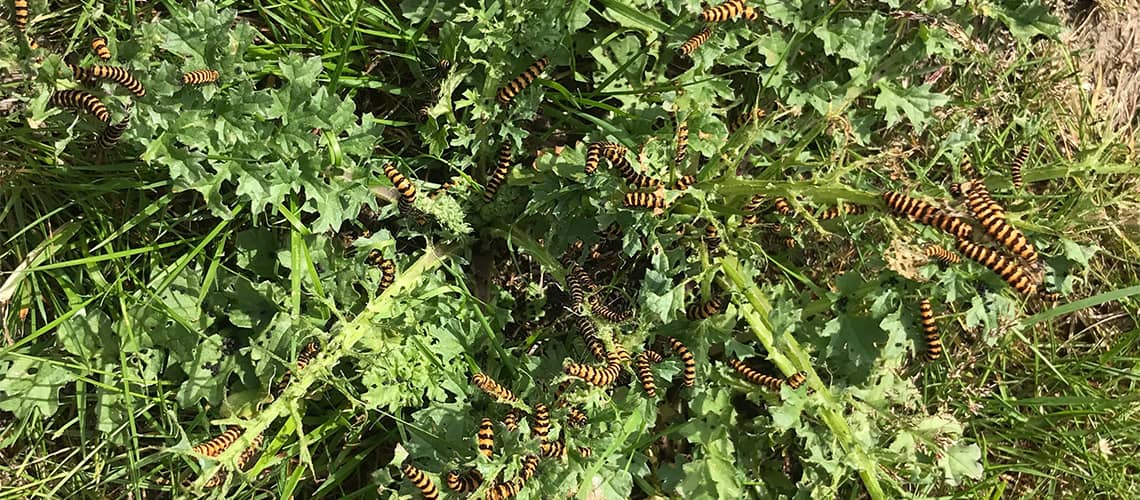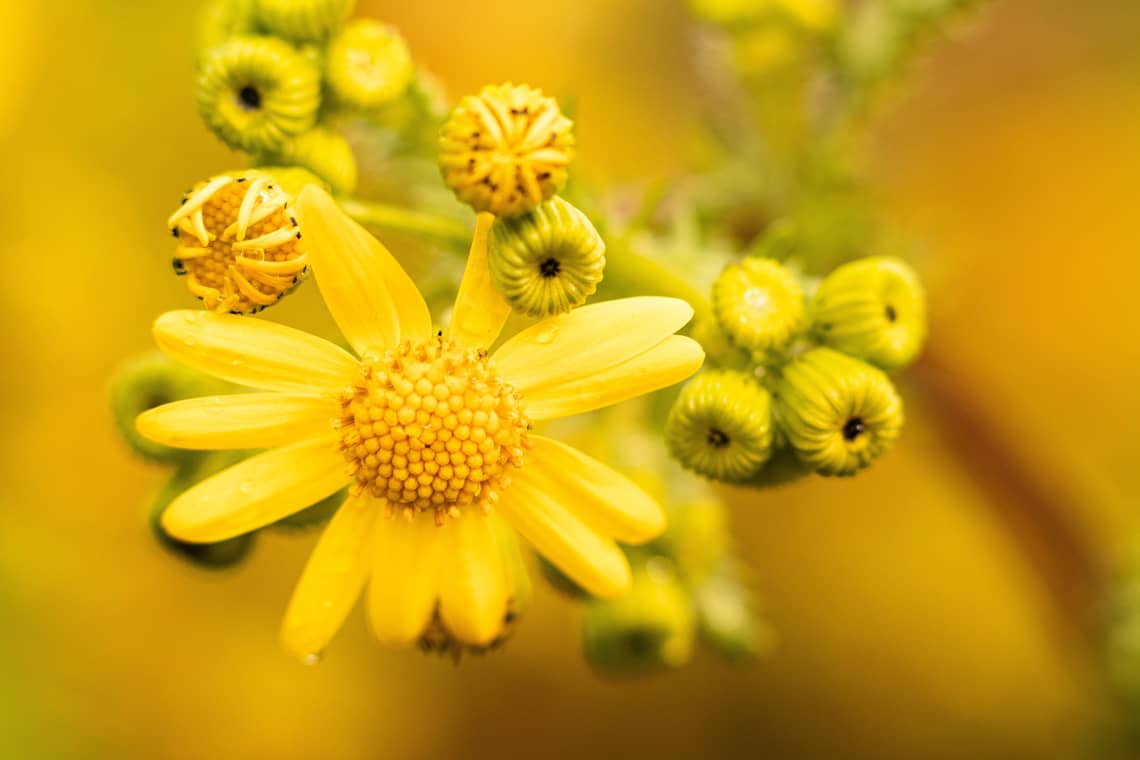Effective ragwort control is high on the agenda of concerns for horse owners. This common weed plagues our paddocks and fields.
What is ragwort?
Ragwort (Senecio jacobaea) is native biennial with pretty yellow flowers and a traditional sight in the British countryside. It’s a preferred food source for several types of British insects and can also be found in many home gardens, on scrubland and on roadside verges. The distinctive yellow and black striped caterpillars of the Cinnabar moth are often seen feeding on the foliage. So, why has ragwort control become so important, and whose responsibility is it?

The caterpillars of the Cinnabar moth feeding on Ragwort.
The responsibility for ragwort control rests with the occupier of the land and farmers that have land rented under Agricultural Holding Act or Farm Business Tenancy agreements should enforce their lease provisions regarding the spread of this noxious weed. Farmers and landowners should seriously consider the implications of the spread of this weed and if they have concerns, contact their agrichemical consultants or environmental consultants for further advice.
You can also report a ragwort infestation using this form.
Why is ragwort dangerous to horses?
Ragwort contains the toxic compounds pyrrolizidine alkaloids, and if ingested by horses (and other livestock) it can cause irreversible liver damage. Fortunately the ragwort plant has a very bitter taste while growing that horses find very off putting. Only the hungriest of animals will endure it.
However, when the plant dies the bitterness is lost and the ragwort remains highly toxic. Ragwort poisoning damages the liver, resulting in severe disease and in some cases death. The results of ragwort poisoning might not be seen for months or even years after the plant is eaten, therefore it’s imperative for horse owners to eliminate ragwort from their grazing land.
How to get rid of ragwort in a horse field
Ragwort is a biennial plant, meaning that it only flowers every two years. In order to ensure that any infestation is cleared, it must be regularly monitored and treated for at least two years.
Once a ragwort infestation has been identified, you have several choices for removing it. If you’ve been lucky enough to find it early, hand removal could be an option. Always wear gloves when handling ragwort, and arms and legs should also be covered. A facemask should be used to avoid the inhalation of ragwort pollen.
Removal is easiest from wet soil. You must ensure the whole of the root is removed, as any fragments left will result in the ragwort regrowing. Continue to monitor the area and remove any new growth as needed.
No single herbicide treatment will completely eliminate a ragwort infestation due to successive germinations of the weed. Treatment with selective herbicides can be made to the plant rosettes, usually in late spring and the autumn before frost damages the foliage; however, the exact time of year will be stipulated on the label of the selected herbicide. Only approved products should be used (a list can be found at www.pesticides.gov.uk), and some products require a qualified specialist to carry out the application. Check for weed suitability, and in the event that an off-label herbicide is selected users will need to obtain (and digest) the relevant Notice of Approval (published by the Pesticides Safety Directorate).
Prior to carrying out treatment a full risk assessment and COSHH should take place and only be carried out by a trained and certified sprayer. It will be necessary for all livestock to be removed from the pasture being sprayed, each products has its own specified grazing interval; however, it will not be safe for animals to return and graze until the plant has completely disintegrated.

Ragwort’s distinctive cluster of yellow flowers.
How to dispose of ragwort
Once the ragwort plants have been removed from your land, it’s important to make sure that they are disposed of appropriately. Ragwort is able to seed, even when removed from the ground, so you should store it carefully. It can be burned safely in small quantities at a safe location away from buildings and animals. It can also be rotted down in a secure lidded compost bin. Professional ragwort removal companies can also dispose of it offsite for you.
Using ragwort removal companies
If you’re feeling overwhelmed by the infestation, you may wish to recruit a professional ragwort removal company.
PBA Solutions are accredited, highly experienced specialists in treating invasive weeds. Our guaranteed, market-leading invasive weed solutions meet the varied needs of homeowners, developers, councils and other organisations. We are accredited by The Property Care Association, SafeContractor and CHAS.

